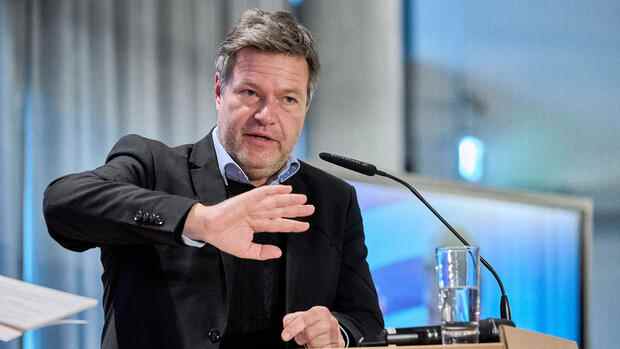The larger the company, the greater the concerns in Brussels, explained the Federal Minister of Economics.
(Photo: IMAGO/Mike Schmidt)
Berlin Federal Economics Minister Robert Habeck (Greens) believes that improvements to the electricity and gas price brakes for industry are out of the question. “I can give you little hope that the EU Commission will talk to you again about this,” he said on Thursday at a conference of the paper industry.
His ministry had exhausted all possibilities, in his estimation there was “not a millimeter of room for negotiation” left. The EU Commission has no problems with the aid planned by the federal government for private households and small companies. However, the larger the companies become, the greater the concerns of the Brussels authorities regarding state aid, said the Federal Minister for Economic Affairs.
The federal government wants to relieve private consumers and companies with the electricity price brake and the gas price brake. She had recently presented the relevant draft legislation. They provide basic quotas for each consumer for the purchase of gas and heat as well as electricity. The federal government pays the difference to the actual prices.
For large consumers from industry, funding caps and strict rules and obligations to provide evidence should apply in order to meet the relevant requirements of the EU subsidy framework. The EU Commission last adjusted and extended the temporary crisis framework for state aid (Temporary Crisis Framework, or TCF for short) at the end of October.
Top jobs of the day
Find the best jobs now and
be notified by email.
In many places, the TCF system contradicts the recommendations of the gas expert commission set up by the federal government, which developed the model for the gas price brake. The federal government had promised to take the Commission’s model into account as comprehensively as possible in its draft law. Contradictions to the TCF were therefore foreseeable.
According to the industry, upper limits are not sufficient
The industry complains that the planned price brakes had to be capped for reasons of state aid law, which they believe are not nearly enough. There is an upper limit of 150 million euros per individual case for the aid. This amount refers to aid for gas, heat and electricity. In specific individual cases, it may be that a company reaches the upper limit with the aid for gas purchases alone and gets nothing for electricity purchases.
Covered lid
150
Million Euros
is the maximum that a single company can receive in aid for gas, heat and electricity.
From the chemical industry it is said that the upper limit of 150 million euros does not reflect the reality of many larger chemical companies in Germany. The extreme price increases could only be offset to a small extent with this amount.
If a company wants to claim a higher amount, it must notify the EU Commission on a case-by-case basis. In the affected industrial sectors, it is said that this option will probably hardly be used because it is associated with even stricter requirements.
It is not only from the point of view of the large consumers from industry that the planned regulations on the electricity price and gas price brake have major shortcomings. The renewables industry is also critical of the plans. The industry’s criticism is sparked by the planned revenue skimming, which is part of the electricity price brake.
In particular, the operators of biogas plants see themselves pushed into a corner. As with operators of photovoltaic systems, wind turbines, nuclear and lignite power plants, 90 percent of the turnover that exceeds certain thresholds is to be skimmed off.
The upper limit of 150 million euros for industrial aid is quickly reached for large companies, but at the same time the conditions are too narrow and too complicated from the point of view of the industry.
(Photo: dpa)
However, the biogas plant operators see themselves in a different situation than the wind or photovoltaic sector. Because their costs have increased significantly in recent months. They also refer to the system usefulness of their systems. Unlike wind turbines or photovoltaic systems, biogas systems can be controlled depending on the electricity requirement.
Greens criticize the Ministry of Economic Affairs
The arguments of the operators of biogas plants also catch on in the federal states. In a letter from the Schleswig-Holstein Ministry of Energy and Climate Protection, led by Green politician Tobias Goldschmidt, to the Federal Ministry of Economics, it says that the inclusion of biogas in the skimming plans is “not plausible”. Because biogas plants guarantee flexibility and stability in the power grid, especially in the current gas crisis, thanks to the possibility of flexible operation. In addition, the variable costs for biogas plants have recently risen sharply, according to the letter available to the Handelsblatt.
The Greens parliamentary group has also pricked up their ears. In a letter from the Green energy politician Julia Verlinden to industry representatives, it says that the Greens are aware with regard to the skimming plans that “separate regulations must be made for renewable energies such as bioenergy”. That is why we are committed to improving bioenergy.
More: This is how the construction of the LNG terminals is progressing
